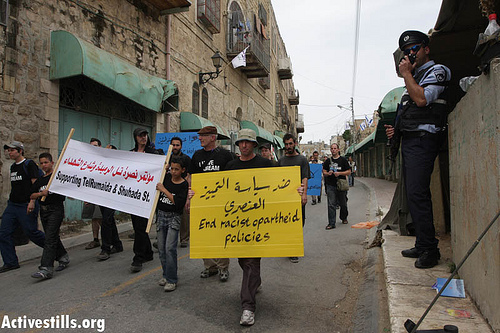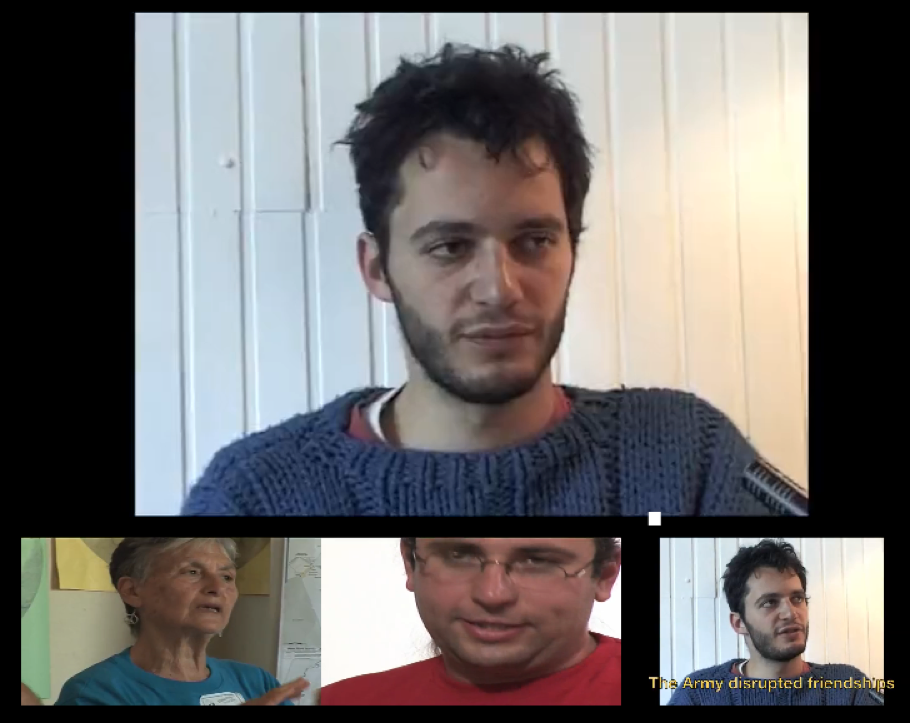The Only Democracy? » On The Ground Reports » On February 25th, World Says Open Shuhada Street
On February 25th, World Says Open Shuhada Street
By Rebecca Kirzner
Few will have the greatness to bend history itself; but each of us can work to change a small portion of events, and in the total; of all those acts will be written the history of this generation.” – Robert Kennedy, address delivered at the University of Capetown, South Africa, June 6, 1966.
What will be the history of this generation, and which small acts carried out by which individuals, groups, governments, and campaigns will come to define the first decades of the 21st century? Perhaps it will be an era about which we can recount with pride to our children’s children – an era in which we were part of the force that “bent history” and an era in which we witnessed a “small portion of events” catalyzing a real change for global justice.
On Thursday, February 25, such an event will be taking place in cities around the world. The “Open Shuhada Street” campaign seeks to unite the voices of activists in a common cry for an end to the discriminatory and racist policies which make life intolerable for the Palestinian residents of Hebron/Al-Khalil, and which threaten human rights everywhere.
Open Shuhada Street! February 25, 2010 International Day of Action from Open Shuhada Street on Vimeo.
In over 25 cities worldwide, from Hebron to Cape Town to Prague to New York, supporters of human rights will close streets, petition the Israeli government, and hold protests, vigils, lectures, movie screenings and panel discussions in solidarity with the Palestinians who live the daily realities of the Israeli occupation of the West Bank. This series of coordinated events intends to protest the closure of a street which long served as the commercial, historic, and religious center of Palestinian life in Hebron, but has been closed in the name of security for the Jewish settler population.
Hebron is one of the largest cities in the West Bank, and Shuhuda Street was once the heart of its City Center. Following the 1994 Baruch Goldstein massacre of unarmed Palestinians worshipping in a mosque, and fearful of a Palestinian counter-attack, Israeli law-enforcement authorities implemented a total legal and physical separation of the city’s Jewish and Palestinian residents. The entire City Center was placed under Israeli military control with access rights exclusively reserved for Israeli settlers and soldiers, de facto evicting tens of thousands of Palestinian residents and shutting down over a thousand Palestinian businesses.
The area, once a vibrant, busy city center, now is functionally a ghost town. The businesses, long closed, wait for their owners to reclaim the inventory locked within, and to erase the hateful graffiti written on the welded doors. Families, forced to flee to different neighborhoods of the city, have been waiting in anticipation of a return to their houses and possessions for many years. In reality, Israeli military-imposed movement regulations prevent Palestinians from entering Shuhada Street at all, and Palestinian vehicles from driving through most of the City Center. Those unable to flee the stifling restrictions and the virtually unaddressed settler violence in the area are forced to find new ways to survive, even if it means sometimes entering their houses by climbing over the rooftops.
The policies constitute a violation of Palestinian rights of movement, safety, property, and many others, not to mention breaches in international humanitarian law. The acts cause the suffering of the Palestinian population in an effort to protect settlers, many of whom are ideological radicals whose violent acts are in effect, sanctioned by the lack of military or police action.
The closure of Shuhada Street is but a microcosm of the greater injustice of the occupation of the Palestinian territories. Although it is clear to us that more fundamental systematic change is essential if there is to be just peace in this troubled region, this campaign to open Shuhada Street is an important catalyst that brings together the passion and mobilizing capacity of activists from around the world to stand in solidarity with the people of Israel and Palestine in the struggle against racism and discrimination. This conflict does not belong only to Jews and Arabs. In this era of hyper-globalization, we are all surely implicated in this conflict and thus responsible for holding peoples and governments accountable to ensure that human rights and dignity are protected. Change only occurs when there is pressure from both within and without. International pressure has proven, throughout recent history, to be a positive and effective tool for change. With sufficient pressure on the Israeli government, it remains an attainable hope that Shuhada Street will again be opened to Palestinians and that life can return to the streets of Hebron.
This Thursday’s activities will demonstrate that there is a global community who believes that racism does not end when a city is forcibly segregated, that ignoring violations does not make them go away, and that “history of this generation” can be written by raising awareness and a global chorus of voices against bigotry in all forms.
Filed under: On The Ground Reports · Tags: Day of Action, Hebron, Open Shuhada Street









 “You have a choice! Israeli Anti-Militarists Speak”
“You have a choice! Israeli Anti-Militarists Speak”